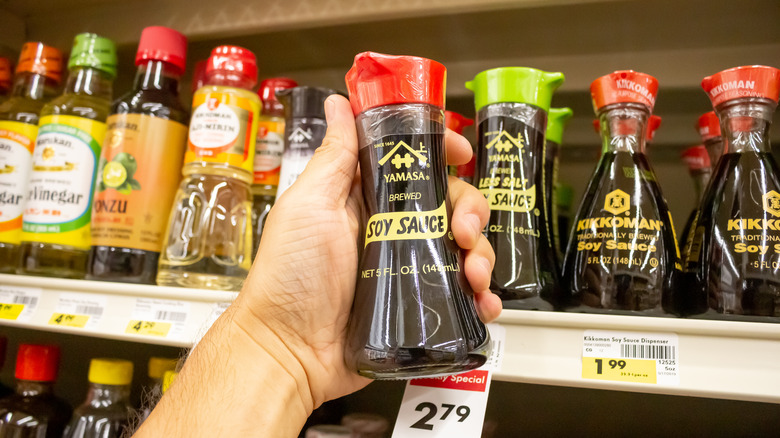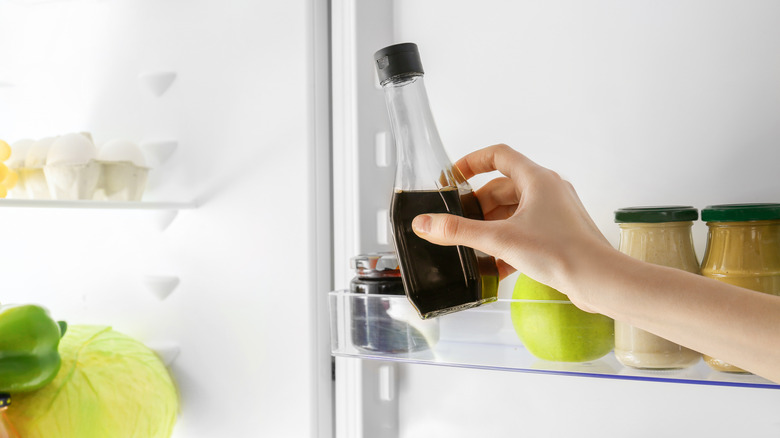Does Soy Sauce Actually Need To Be Stored In The Fridge?
Even if you only dabble in Asian cooking, it's likely that you've purchased a bottle of soy sauce. Prominently used in many cuisines, this sauce made from soybeans comes in many types and packs in varying degrees of its magical salty-savory flavor. As a result, it becomes quite easy to have one, two, or more opened varieties of soy sauce accumulating in the pantry. Glancing at the opened bottles, you might have stopped and wondered; should they ever go in the fridge?
Well, rest assured your typical bottle of soy sauce won't go bad at room temperature soon after opening. Its fermented nature and high salt content means the liquid won't sprout unhealthy bacteria, so no fears regarding food safety. However, as with other liquids that are exposed to oxygen, the flavor will start to degrade over time. If you have a bottle opened for two or three years, then the contained liquid will be unusable simply because it won't taste good.
That said, just because soy sauce is shelf stable is safe at room temperature doesn't mean you should leave it unrefrigerated. If you don't cook with soy sauce often, it's recommended that you throw the opened bottle into the fridge, even though it will remain safe to consume at room temperature. This is because the fridge can help the soy sauce stay fresh longer. A typical bottle will stay at peak freshness and flavor for around 3 to 6 months if left at room temperature, while refrigerated sauce can last for 6 months or more. And no matter where you're storing it, steer clear of adding any components into the sauce; these will be sure to accelerate deterioration.
While not essential, refrigeration is recommended for most soy sauce
With so many soy sauce varieties, finer details about the best storage method and time heavily depends on the type you have. Some — like a light soy sauce — pack in a saltier flavor, so storage time has less of an impact on the palate. However, the one common denominator is light and heat. Keep all types of soy sauce in a cool, dark place to enhance flavor. Past that, it is useful to consider the type of soy sauce you have on hand.
If you've paid top dollar for an extra-aromatic soy sauce like a Japanese marudaizu shoyu, then it's definitely a good idea to store in the fridge. Unless you're planning on using it all in the coming month after opening it, you won't want to leave it out and risk flavor degradation. And the same applies to soy sauces with many additives, like the thick Indonesian kecap manis, which comes with sugar and seasonings. The more the sauce strays from its core fermented formula — which will happen faster at room temperature — the greater odds of an off-tasting flavor over time.
Additionally, check the label of your soy sauce — some contain preservatives, which means less stress if the fridge is full. And if you dig up an old opened bottle, always give it a smell. If it's funky, remember there's an easy soy sauce substitute that's already in your pantry. After all, soy sauce is just too affordable and ubiquitous to be worth a risk. So keep such considerations in mind, and you'll be able to make those sticky soy steak bites shine.

